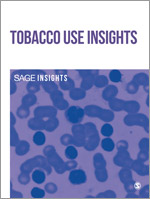 Abstract
Abstract
Adolescent smokers tend to have friends who also smoke. This association has been attributed to peer socialization and peer selection effects. However, evidence regarding timing and relative magnitude of these effects is mixed. Using a random-intercept cross-lagged panel model, we examined the reciprocal relations between adolescent cigarette use and perceptions of friends’ cigarette use in a sample of 387 adolescents, assessed annually for 4 years. Adolescent cigarette use predicted increases in perceived friend use before the reverse effect emerged. Further, some of the effect of early adolescent cigarette use on subsequent use was mediated by changes in perceived friend use. The results support a greater role for friend selection than socialization in predicting early adolescent cigarette use.
Authors
- Christopher M. Loan
- Atika Khurana
- Joanna Wright
- Daniel Romer

